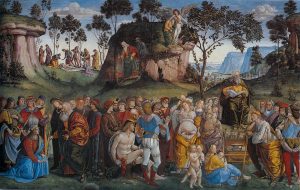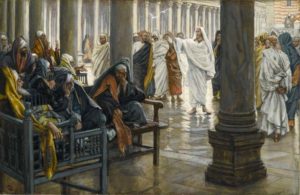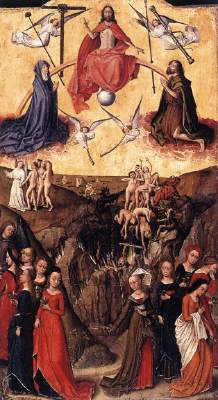Thoughts on Sunday’s Lessons for Oct. 29, 2023 (Pentecost 23A)

Testament and Death of Moses (1482), fresco by Luca Signorelli (1450-1523) and Bartolomeo della Gatta (1448-1502). Sistine Chapel, Rome. (Click image to enlarge.)
First Reading (Track One): Deuteronomy 34:1-12
In Sunday’s Track One first reading we reach the end of the first five books of the Hebrew Bible, known as Torah. Moses has led the progeny of Abraham, Isaac, Jacob and Joseph out of slavery in Egypt, received God’s commandments and made God’s covenant at Mount Sinai. He has wandered 40 years in the desert with a fractious people. Now he comes within sight of the Promised Land where he meets God again on another mountain top. But this time Moses learns that he may see the land, knowing that God’s promise is fulfilled, but he won’t live to cross over to it. His successor, Joshua, will lead the people across the Jordan into Canaan.
First Reading (Track Two): Leviticus 19:1-2, 15-18
Leviticus, the book of the Levites, the hereditary Temple priests, is full of rules, regulations and teachings that govern behavior and Temple liturgy. We turn to Leviticus in our Track Two first reading as God instructs Moses in the ways in which we are to love our neighbors as ourselves. God’s teaching – Torah – leads directly to Jesus’ teaching in this week’s Gospel. In a series of instructions that restate the moral code of the commandments, God’s words to Moses in this reading tell us how to be in good relationship with our neighbors. They culminate with the summary conclusion – the first place in the bible where this is explicitly stated as a rule – that we shall love our neighbors as we love ourselves.
Psalm (Track One): Psalm 90:1-6, 13-17
This psalm, attributed by tradition to Moses himself, sings praise for God’s eternal ongoing creation in which a thousand years pass like a day. In comparison, our lives are as evanescent as the grass that turns from green to brown overnight. Then the narrative turns from praise to petition as we ask God to hear our prayers, to turn toward us with loving-kindness and make us glad.
Psalm (Track Two): Psalm 1
This, the first of all the psalms, sings of two paths that we may choose to take through life. In poetic verses that might remind us of Jesus’ parables about seeds that fall on variously nourishing ground, the Psalmist likens us to trees. The well watered trees of the righteous who follow in God’s way grow lush and fruitful. But the way of the wicked yields weak trees that can’t stand straight. Which way to choose? The Psalm makes the fruitful choice abundantly clear.
Second Reading: 1 Thessalonians 2:1-8
Paul’s first letter to the Christian community in Thessaloniki in Macedonia, Norther Greece, is the earliest Pauline letter that has come down to us. Paul repeatedly speaks of his love and family feeling for this community. Intriguingly, he contrasts this by writing openly about his problems with the congregation in nearby Philippi! The Philippians had some serious problems at this time, and someone there seemingly didn’t treat Paul well. With the people of Thessalonika, though, Paul developed a dear friendship that he likens to a nurse caring for her children. (Happily, things had evidently cleared up a few years later, when Paul’s letter to the Philippians was kind and generous, too.)
Gospel: Matthew 22:34-46
We may think of Jesus’ words about the greatest commandment as profoundly Christian, deeply reflecting everything we know about Jesus. And this is true. But we should never forget that these words are deeply Jewish too. The “greatest and first” commandment, by Jesus’ own statement, directly quotes part of the Sh’ma, the most important Jewish prayer; the second comes straight from the Holiness Code in Leviticus. Our spiritual heritage goes back a long way, and as we heard from Jesus earlier in Matthew’s Gospel, Jesus did not come to abolish the Law and the Prophets (that is, the Tanakh, the Hebrew Bible) but to fulfill it.


